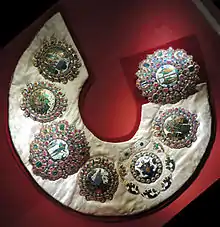barma
See also: Barma
English

The barmas of tsar Alexey Mikhailovich
Etymology
From Russian барма (barma).
Noun
barma (plural barmy or barmas)
- A regal Russian mantle or neckpiece made of gold, encrusted with diamonds and other gems.
- 1873, William Palmer, editor, Testimonies Concerning the Patriarch Nicon, the Tsar, and the Boyars, from the Travels of the Patriarch Macarius of Antioch, London: Trübner and Co., […], page 390:
- The tsar kissed the regalia, and covering the cross and the barma, gave them on the dish to the protopope, and the crown he gave to Lucian Stepan.
- 1974, Medals and Coins of the Age of Peter the Great, page 46:
- Half-length figure of Peter, three-quarters, in full regalia, with barmas, Cap of State, sceptre and orb.
- 1991, Paul D. Steeves, editor, The Modern Encyclopedia of Religions in Russia and the Soviet Union: Apocrypha-Basilians, Academic International Press, →ISBN, page 221:
- The barmy consisted of panels of lace fastened together to form a circular fabric, which when laid on the tsar’s shoulders over his robe looked like a broad collar.
- 2001, Barry Shifman, Guy Walton, editors, Gifts to the Tzars 1500-1700: Treasures from the Kremlin, Harry N. Abrams, →ISBN, page 148:
- Barmy were official attributes of the authority of the grand duke and later the tsar.
- 2006, Science in Russia, page 81:
- In 1831 the Armory got a welcome addition in what was described as “the Ryazan treasure”, the gold princely pendants and barmas, the small shoulder mantles of precious décor worn by Moscovite princes.
Further reading
 Regalia of the Russian tsars § The Barmas on Wikipedia.Wikipedia
Regalia of the Russian tsars § The Barmas on Wikipedia.Wikipedia
Fula
Etymology
From Bambara [Term?].
References
- D. Osborn, D. Dwyer, et J. Donohoe, Lexique Fulfulde (Maasina)-Anglais-Français: Une compilation basée sur racines et tirée de sources existantes, suivie de listes en anglais-fulfulde et français-fulfulde, East Lansing: Michigan State University Press, 1993.
- Richard Smith, Urs Niggli, Dictionnaire fulfulde - anglais - français, Webonary.org, SIL International, 2016.
Gothic
Hungarian
Pronunciation
- IPA(key): [ˈbɒrmɒ]
- Hyphenation: bar‧ma
Declension
| Inflection (stem in long/high vowel, back harmony) | ||
|---|---|---|
| singular | plural | |
| nominative | barma | — |
| accusative | barmát | — |
| dative | barmának | — |
| instrumental | barmával | — |
| causal-final | barmáért | — |
| translative | barmává | — |
| terminative | barmáig | — |
| essive-formal | barmaként | — |
| essive-modal | barmául | — |
| inessive | barmában | — |
| superessive | barmán | — |
| adessive | barmánál | — |
| illative | barmába | — |
| sublative | barmára | — |
| allative | barmához | — |
| elative | barmából | — |
| delative | barmáról | — |
| ablative | barmától | — |
| non-attributive possessive - singular |
barmáé | — |
| non-attributive possessive - plural |
barmáéi | — |
Italian
Etymology
The origin of this word is uncertain. Both a pre-Celtic origin (ancient Ligurian) and a Celtic origin have been argued for.
Numerous toponyms of the Western Alps find their etyomology in this term and its variations: e.g., the comune of Balme, the Colle della Barma and the village of Barmasc (which also contains the ancient ligurian suffix -asc/ascu).
(This etymology is missing or incomplete. Please add to it, or discuss it at the Etymology scriptorium.)
Pronunciation
- IPA(key): /ˈbar.ma/
- Rhymes: -arma
- Hyphenation: bàr‧ma
Old Norse
Zarma
This article is issued from Wiktionary. The text is licensed under Creative Commons - Attribution - Sharealike. Additional terms may apply for the media files.